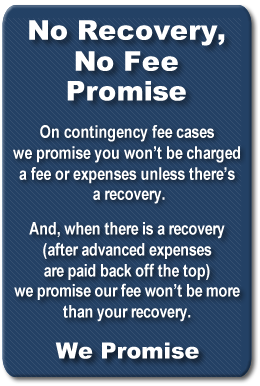North Carolina Workers Compensation Benefits & Payments
If you are involved in an accident and injured on the job or suffer an occupational disease you have the right to make a claim for (1) Medical Care (2) Lost Wages, and (3) compensation for any Permanent Injury/Disability.
1. Medical Care for Your Workers’ Comensation Injury
Medical care under workers’ compensation includes medical treatment, attendant care and rehabilitation.
Medical Treatment
You are entitled to medical treatment in a workers’ compensation claim. These benefits include emergency medical care and hospitalizations or other urgent care treatment necessary to treat your workplace injury or illness when it first occurs, as well as follow up care. Typically, the employer is allowed to direct your medical care and will choose your physician once a claim is open. The insurance carrier will cover doctor visits with an authorized treating physician, referrals to a specialist such as an orthopedic physician, surgeries, physical therapy, medication and any other treatment you may need. In some cases, chiropractic treatment may be allowed. In catastrophic injury cases, workers’ compensation benefits will also cover the costs of medical equipment, such as a wheelchair, to help you deal with your injury. Certain treatment, such as counseling and pain management, may also be covered. While under North Carolina law your employer’s workers’ comp insurance company directs your medical care and chooses your medical providers, you have the right to request to change your doctor, if you feel you are not receiving the care you deserve. An experienced workers’ comp lawyer can explain your options.
Even though medical care is provided, disputes can arise during this process regarding medical care. In those cases, an experienced attorney can assist you.
Attendant Care
If you suffer a severe or catastrophic injury at work and cannot care for yourself, you may be entitled to attendant care services. This involves assistance with daily tasks of living. Often following a serious accident, a spouse or immediate family member may fall into this role and serve as a caretaker. A spouse or loved one may even put his or her own career on hold to help the injured family member. In these cases, most people do not understand that they may be entitled to request attendant care pay for a family member.
If a loved one has been forced to rearrange his or her life to care for you, there may be a claim for attendant care benefits. Attendant care claims are complex, often disputed and an experienced workers’ compensation attorney can assist you.
Rehabilitation
Workers’ compensation benefits will typically cover medical and other care, like physical therapy that may be necessary to help an injured worker recover from their injury or illness. This type ofbenefit may also cover the care and training necessary for the individual to regain skills and abilities necessary to return to work. Sometimes the injured worker cannot return to the job he or she was performing at the time of the injury. The employee may require retraining or assistance in finding another career that the employee can do within his new limitations. If an injury or illness prevents a worker from returning to their job, these types of benefits can pay for evaluation, retraining, tuition and other expenses related to helping the injured worker become qualified to work a different job.
2. Payment of Wages During Your Workers’ Compensation Claim
If you are out of work due to an injury on the job, under North Carolina workers’ compensation law, you will typically receive Temporary Total Disability (TTD) two-thirds of your “average weekly wage.” If you can return to work, but make less money due to the injury, you can receive Temporary Total Disability (TTD) benefits under North Carolina workers’ compensation law to make up for the shortfall.
3. Compensation for Your Permanent Injury/Disability
Under North Carolina workers’ compensation law, you can receive compensation for any permanent injury you have after the doctor releases you from care. If you can never return to any kind of work, you may be given a disability rating for Permanent Total Disability (PTD) or Permanent Partial Disability (PPD) benefits. If you have a permanent injury or cannot return to work, you should consult with an experienced workers’ compensation attorney, as the calculation of what you are owed may be contested by the workers’ comp insurance company.
Free Consultation for Your Workers’ Compensation Claim
For help with your workers’ compensation claim, call us at 919.277.0161 or contact us online for a free, no obligation consultation. The law firm of Hemmings & Stevens, PLLC has offices in Raleigh, but we handle workers’ compensation cases statewide in North Carolina. We will provide a free consultation by phone, or we may offer to meet with to you if you are unable to travel to our office.
This article regarding workers’ compensation benefits is intended for informational purposes only and is not legal or medical advice. If you have been hurt on the job, you may need to seek the advice of a workers’ compensation lawyer at the law firm of Hemmings & Stevens, PLLC that has experience in these matters.











